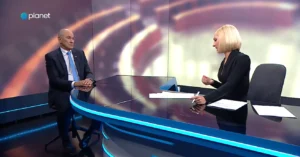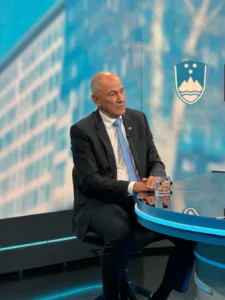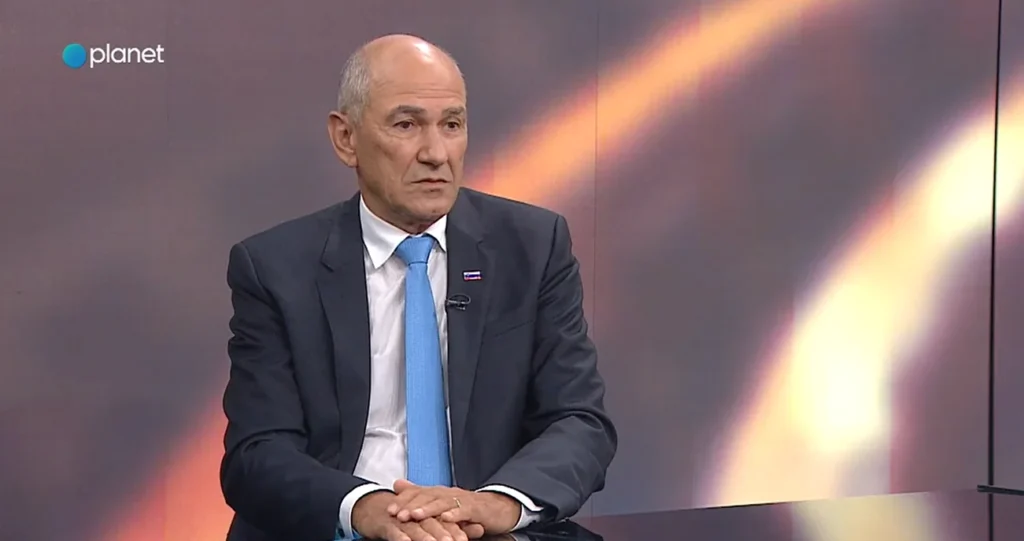“The situation is worse now than it was three years ago – or even a few months ago, but above all, it is much worse than it could have been,” said the President of the Slovenian Democratic Party (Slovenska demokratska stranka – SDS), Janez Janša, on the show Planet 18 on the television channel Planet TV, pointing to a recent calculation by the newspaper Finance that says the standard of living for citizens in Slovenia fell by 13 percent during the term of the Golob government.
Former multiple-term Prime Minister Janez Janša said that he has been spending a lot of time among the people over the past year, and talking to them. “I often ask the question; do you think the situation would have been better or worse if Golob’s government had done nothing and been completely passive. Eight out of ten people say that the situation would have been better if this government had done nothing.”
The problem lies in management
According to Janša, people assess the situation primarily in terms of their own pocketbooks, i.e., in terms of their prosperity. “According to calculations recently published by Finance, our standard of living has fallen by 13 percent during this period. Fifteen years ago, 4 million Croatians had approximately the same GDP as 2 million Slovenians. Their average net salary was half that of Slovenians’. At the beginning of this term, the net salary in Croatia was just over a thousand euros, now it is 1,400 euros, while we have gone up by 100 euros during all of this time,” he said, adding that it would be difficult to claim that Croatia had, say, discovered oil reserves that they had started to sell, or dug some gold mines during this time. Nothing has happened; we are part of the common European market; we are in NATO. Although, according to Janša, Slovenia is in a better position than Croatia in terms of its development history and the length of the war during its fight for independence, Croatia is progressing faster. “In other words, the problem lies in management.”
Democracy is not established through purges
The Prime Minister has repeatedly emphasised that the government has fulfilled one of its main pre-election promises, namely, to rid the country of Janša’s supporters, restore democracy, respectful communication, and respect for the rule of law. When Janša was asked how successful they had been, he replied that it is difficult to say that you could establish democracy by purging Slovenia of Janša’s supporters or by purging the national media outlet, Radio-Television Slovenia (RTVS) and the police of Janša’s supporters. “Democracy is not established through purges. Democracy is a system where everyone has roughly the same opportunities and where people decide who will be in government through elections. This does not mean that those in government now have the right to remove from office or from anywhere else, even from civil service positions, those whom they consider to be of a different political persuasion.”
Janša said that if their government had acted in this way, the accusations levelled against them would have been justified, but this was not the case. He emphasised that if he were to be in power for the next term, he would not be heard saying or implementing a sentence like, for example, the police would be purged of Golob supporters. Although it is common in politics for a person to surround themselves with people they can work with, Janša pointed out that the police or RTV Slovenia cannot be considered part of the Prime Minister’s inner circle. “When you come to power, you have to make an effort to keep capable people in positions, to attract them, to get them to work, to ensure that those in decision-making positions are people who know what they are doing,” he made it clear.

This is not about the Bobnar case, this is about purging Janša’s supporters
The conversation also touched on the Bobnar case and the findings of the Commission for the Prevention of Corruption (KPK), with the host of the show recalling that the Prime Minister had previously stated that he would resign if the Commission for the Prevention of Corruption found that he had violated the principle of integrity. According to Janša, this is not about the Bobnar case, as widely reported in the media. “This is about purging Janša’s supporters. That is why this dispute arose. Ms Bobnar is not some innocent lamb here. The two of them agreed that she would purge the police of Janša’s supporters. She did this for a year. They fell out after the alleged Janša supporters were no longer in the police force, and it was the turn of one of her friends to be replaced, and she refused to let him go,” he explained.
“So, this is not about the Bobnar case, it’s about the problems we talked about earlier. It’s about a situation in which the left-wing political option came to power after two years of difficult times due to the COVID-19 pandemic. The left-wing political option has been in power for 70 of the last 80 years. During the 34 years of independent life in an independent country, it has been in power for 25 or 26 years. The few people who were appointed to various positions during our term, perhaps representing a few percent of the entire administration, had to be purged. This is scandalous,” he said, adding that, in his opinion, those who did this should have been held criminally responsible right from the start, and not only after three years.
When asked how he feels about politicians praising an institution in a certain way, cooperating with it until it goes against them, and then suddenly declaring that body unnecessary, he explained that he himself does not intend to defend the Commission for the Prevention of Corruption. “For three years, or two years and a few months, they have been investigating something that was said, recorded on camera, and is circulating on the internet. The Prime Minister himself said that he had ordered – that they agreed – that Janša’s supporters should be purged. I don’t know what there is to investigate here,” Janša pointed out, adding that they should have given their opinion on this matter two years ago already. “This is not about whether he respects a certain institution or not, it is about what he said in response to a direct question from your journalist colleague, who asked him whether he would resign if this Commission found that he has violated the principle of integrity, and he answered that he would.”
If the authorities were independent, then what is currently happening would not be happening
If, according to Janša, the authorities are independent, then what is happening in Slovenia should not be happening. According to him, there is a deputy chairperson at the Commission for the Prevention of Corruption, who is leading the case against Janša’s supporters, or the Bobnar case. “According to my information, she is a friend of Ms Bobnar. How can she lead this case independently? Let no one think that I am defending Mr Golob here. I am talking about the fact that in Slovenia, the word ‘independent’ often simply means that there is someone there who is only persecuting us.” He also spoke about expectations in the Trenta case, where he was acquitted, but the verdict is not yet final. “Not only is this acquittal not final. It was handed down on the 18th of April at the first instance court, and the verdict should have been issued in writing within 30 days, but now it’s mid-October and we still don’t have it,” he said critically, adding that they are again playing the card of letting the case become time-barred before it becomes final.
According to Janša, if we look at how the phrase “freedom of the media” came about, it refers to freedom of speech, freedom of thought, speech, and expression of the individual. “The media are here to enable freedom. The media as an institution does not have human rights in the sense that they can talk about media freedom; it is about the freedom of the individual. Here, we often find ourselves in a situation where the individual’s freedom of expression, freedom of speech, is curtailed by those who should be promoting freedom, opening up space, and so on,” he said critically, pointing to the national television station, where the Prime Minister said to the host in the studio: “You know very well what it means to purge Janša’s supporters, even here on television.” “And she listened to him calmly and nodded along. This means that this media outlet is not fulfilling its basic mission as a media outlet, let alone its role as a national media outlet,” Janša added critically.
When you are sick, you don’t care whether you receive treatment in a public or private institution
According to the government, the reform of the public healthcare system is one of their greatest successes. When asked how he views Slovenian public healthcare and the patients within it, Janša replied that he sees it in exactly the opposite way of how it should be. In his words, patients are not the centre around which the system is organised, so that the fundamental right to health, for which we pay, can be realised. Instead, the dispute within this government coalition and the insistence revolves around the dilemma of whether to have public or private healthcare. “Someone who is sick doesn’t care where they will receive services for the money they pay for compulsory insurance. The debate is going in the wrong direction, the search for solutions is going in the wrong direction,” he said clearly. He also criticised the law that threatens the existence of private kindergartens. “I think this law will not last, if not sooner, it will be repealed next spring.” He believes that the adoption of the law shows this government’s temper. “Instead of the government coalition focusing on improving our lives, it is preoccupied with persecuting imaginary class enemies. Sometimes it’s doctors, sometimes it’s people who run private kindergartens, sometimes it’s businesspeople who need to be driven into the sea with bayonets or at least taxed.”

When asked what they would do about the Christmas bonuses, Janša stated that they are in favour of people receiving the highest possible Christmas bonuses and that these bonuses should be paid wherever there is money available for this purpose. However, they are not in favour of making this mandatory, as this would mean that even those who do not have the money would have to pay for the said bonuses. Janša believes that this would not benefit anyone, as it would cost 80,000 jobs if the private sector and the economy were forced to pay it. “If you pay Christmas bonuses in the public sector at a time of high deficit, you will jeopardise salaries in the next term. Because it has to be paid. If the government comes up with a proposal to pay mandatory Christmas bonuses in the public sector and shows a budget surplus or at least a balanced budget without borrowing, we will be happy to support it,” he added.
With regard to borrowing, Janša is concerned that the figures that have been presented are not, in fact, the final figures. He mentioned that “the Minister of Finance has prohibited budget users from using the budget that was approved for them in parliament, and now they need special consent.” He also stated that “funds are being reallocated from other accounts to pay October salaries, given that the public sector pay rise following the so-called pay reform came as a huge surprise and that the figures are significantly higher than planned.”
All pensioners should be exempt from long-term care tax
With regard to long-term care, he pointed out that during the previous government’s term in office, they had passed a law on long-term care. “The government coalition postponed the implementation of the law for one year, and then introduced additional levies to amend this law. We were accused of not providing financial resources for our solution. This is not true,” he said, recalling that the financial resources for the part of long-term care that would begin to be implemented in 2022 were provided for in the budget. For the following years, they had anticipated a budget surplus that would make it unnecessary to introduce additional levies. Regarding the payment of tax for long-term care, he emphasised that all pensioners should be exempt from this tax, as pensions are payment for past work. “You can’t burden them now with additional taxes. For everyone else, we have proposed a freeze until it is known how many services there will actually be. They are currently collecting hundreds of millions of euros, but there are no services except those that already existed under a different name,” he said critically.
In the interview, Janša also expressed hope that peace is possible in the Middle East. “The Slovenian left is not concerned about the poor children dying in Gaza, but rather about who benefits when there is war there and who would benefit if there were peace. They have said that the left benefits when there is war, but now that peace is on the horizon, it will be the ‘Janšaists’ who will benefit,” he said, among other things, and concluded by noting that the Slovenian Democratic Party is building a coalition with the voters. “In the situation we are in, Slovenia needs a constitutional majority of reason. We will build that. If it is not possible to do so in the first step, we will do it in two steps, in the second step. I think a lot of common sense has been returning to Slovenia lately,” he pointed out, warning that “those who think that the result from 2022 can simply be repeated, that ‘the SDS party and Janša are to blame for everything, and we are the saviours of Slovenia who will save it from dictatorship,’ are very much mistaken.” They will build a coalition with other parties, if necessary, but they will not form weak governments or go out of their way to please others.
Ž. N


